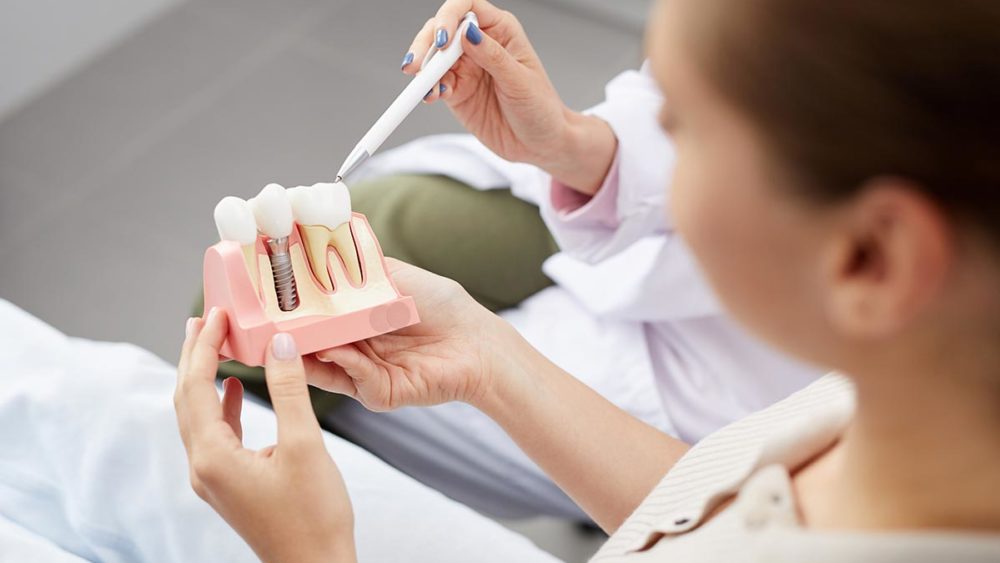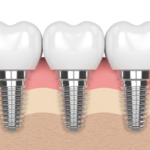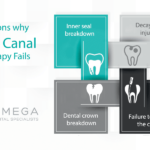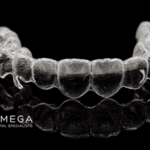How to Care for Dental Implants

Everyone loves showing off their perfect smile. With problem areas like missing teeth, you’re more likely to hide your teeth. A popular remedy for missing or broken teeth is dental implants. In this article, you’ll learn proper dental implants care and maintenance, cleaning techniques, and post-procedure care.
[ See: How to Fix a Broken Tooth ]
Table of Contents
What are Dental Implants?
Dental implants are an artificial screw-like root that connects to a crown. Over time, the artificial root fuses with your jawbone to keep the crown in place. Once fused, it’s nearly impossible for your crown to move, slip, or make noise.
Around 500,000 people get dental implant surgery every year. Dental implants are growing in popularity, and for good reason. Not only do they offer a long-term solution for people with missing teeth, they also help better stabilize dentures.
See: What Are Dental Implants ]
Types of Dental Implants
Dental implants fall under two categories: endosteal and subperiosteal. Endosteal implants are implants inside the jawbone. Subperiosteal implants are placed under the gum either on or slightly above the jawbone. Endosteal implants are the most commonly used implant method.
There are a variety of implant types to choose from. Common dental implants include:
- Single: implant for one missing or broken tooth.
- Multiple: two or more dental implants.
- Bridges: implants that are held together and surround a missing tooth. If necessary, bridges can have implants in each tooth.
- Dentures over dental implants: a permanent foundation to keep dentures or crowns in place.
- All on four: a full row of teeth supported by four implants.
- All on six: a full row of dentures supported by six dentures.
Dental implants are permanent options for damaged teeth. When properly maintained, dental implants last at least 25 years. If you experience trouble with your implants, it’s probably due to lack of care and proper maintenance.
Some people are unaware of how to properly maintain their oral hygiene, especially with dental implants.
Tooth Implant After Care
Stay on top of your dental implant aftercare.
You’re probably wondering how do I care for dental implants after surgery? It’s important to understand the precautions associated with tooth implant after care immediately following your procedure.
For instance, it’s recommended to only eat and drink cold items. Consuming warm foods and beverages cause bleeding and swelling. An hour after surgery, you’re allowed to remove your gauze to eat. Make sure you avoid warm temperature foods and beverages. It’s also recommended to eat soft foods for at least a day after receiving your implant.
Another post-surgery precaution involves making sure you keep your head elevated for at least the first twelve hours. Pain and soreness are normal. To relieve pain, apply a cold compress. Only keep your compress on for fifteen minutes intervals.
For the first 24 hours following your implant surgery, avoid touching your implant with your fingers or tongue. Doing so dislodges forming blood clots, which are natural parts of the healing process. The same applies for rinsing with mouthwash or water.
See Also: Cost of Dental Implants
Avoid hard and sticky foods.
Are there certain foods that hurt your natural teeth before you got dental implants? These foods are even more damaging for your implants. Not only are they harmful for your new teeth, they can damage your surrounding teeth. Damaging your other teeth means you’ll need more dental work, which is expensive.
Once you get your implants, some problem-causing foods include ice, hard candy, potato chips, raw fruits and vegetables, crispy bread, and chips. You should also temporarily avoid spicy food, especially in the earlier stages of recovery. Spicy foods increase oral discomfort and pain. For optimal implant health, sticky foods like caramel, gum, and other soft candies should be avoided.
Refrain from alcohol and tobacco.
Healing after a dental implant surgery can take months. Poor habits like smoking tobacco prolong your dental implant aftercare journey. If you smoke with implants, the chances of your implants failing goes from a little above one percent to nearly sixteen percent. It’s wise for smokers to quit at least a month prior to surgery.
Alcohol consumption also causes problems following dental implant surgery. If you take prescription pain medication, mixing alcohol can end in fatality. Drinking also slows the healing process. Once it reaches your bloodstream, alcohol decreases the production of proteins needed to recover. Without these proteins, your blood won’t clot properly and your implant will fail.
Regular alcohol consumption also leads to dehydration. When your body is dehydrated, your gums have problems accommodating your implant. The blood vessels in your mouth also dilate, which increases sensitivity and pain.
Don’t skip your dental appointments.
Even if your implants feel better, continue scheduling dental appointments. This allows your dentist to make sure you’re healing properly and can alert you of any complications. When you regularly see your dentist, the likelihood of your implants lasting increases.
Dental Implant Cleaning Methods
If it’s your first time getting implant surgery, you’re probably asking yourself how do you clean teeth implants? It’s not much different than your standard oral routine depending on your implant type. One of the key differences is that your oral tissue doesn’t decay the same.
This is not an excuse to neglect your oral hygiene. Over time, oral neglect will show in the appearance and function of your dental implants.
Although implants are made of metal, they still develop plaque. If the plaque isn’t routinely cleaned, the buildup causes gum inflammation on the surrounding tissue. This is the beginning stage of gingivitis.
If left unchecked, gingivitis develops into periodontitis. If periodontitis occurs, gum recession and erosion occur. Over time, the bone supporting both your natural teeth and will erode.
To avoid this, make sure you’re consistent with your oral care regimen. By following these tips, your implants will remain healthy and clean. Keep in mind, dental implants care and maintenance techniques vary based on the implant type.
Fixed Dental Implant Maintenance
Use a soft bristle toothbrush.
When it comes to fixed dental implant cleaning, it’s basically like taking care of your regular teeth. There are, however, a few slight alterations. You’ll need to brush your implants regularly. Instead of a firm bristle brush, you’ll need a soft toothbrush. Most dentists recommend getting a nylon toothbrush.
Nylon toothbrushes have gentle bristles that fit into spaces in or around your dental implants. Standard toothbrushes typically can’t reach between dentures. Harder brushes and metal cleaning tools scratch the surface of your dentures. Instead of using intrusive tools, simply brush your teeth at least twice a day.
Buy sensitive oral hygiene products.
Dental implants are a lot more sensitive than normal teeth. Once your implants are in, do your best to find toothpaste and mouthwash for sensitive teeth. You should also try getting flavorless or mild products. Flavors like mint and cinnamon leave a taste in your mouth that irritates your implants.
Don’t forget to floss daily.
Less than twenty percent of the population floss everyday. Flossing is important for natural oral health but even more so when you have implants. This is because plaque forms a lot easier around dentures, which causes further damage. Luckily, there’s floss designed to properly clean dental implants. Invest in an oral irrigator to get deeper into hard to reach places.
Some people neglect flossing because they forget or feel they simply don’t have enough time. Since you can’t afford to neglect your dental implant maintenance, you must find ways to include flossing in your everyday routine. There are a number of tricks you can use to remind yourself to floss, like:
- Carry floss
Do you know how hard it is to floss when you forget to bring some? It’s impossible. To remedy this, carry floss with you wherever you go. When you leave the house, pop some floss in your bag or pocket, especially if you plan on having a meal. - Set a reminder
Similar to setting an alarm to wake up, try setting an alarm to floss. Whether you’re overwhelmed with work or just forget, your reminder lets you know when it’s time to floss. - Multitask
If you’re doing something sedentary like listening to an audiobook or sitting down watching your favorite show, try flossing then. When you do it this way, you’re more likely to enjoy it than sitting in the bathroom mirror. - Reward good behavior
Rewards are one of the best motivators. When you begin making flossing a habit, give yourself a reward for sticking to your oral hygiene regimen. Eventually, clean teeth and implants will be a good enough reward for flossing.
Overdenture Maintenance
With overdentures, maintenance techniques are also a bit different. Since overdentures are removable, you have to clean your teeth and dentures separately.
Cleaning dental implants isn’t difficult, but you must take precautions to avoid damaging your denture. To start, remove your denture. Rinse your denture under either cool or warm water. Hot water is harmful to dentures. Once you’ve removed lingering food particles, add denture cleaning paste. Brush your dentures with a soft bristle brush and rinse.
As you sleep, allow your dentures to soak in a cleansing solution. Follow your regular oral routine for the rest of your mouth to remove leftover plaque.
Also, keep an eye on the condition of your overdentures. You should replace damaged pieces as soon as possible to avoid a malfunctioning implant.
See Also : What Are Overdentures?
Deep Cleaning Dental Implants
Deep cleaning your dental implants is essential to avoiding peri-implant disease. Peri-implantitis is an inflammatory condition that surrounds the dental implant. Over time, peri-implantitis wears away the bone supporting your implant. To avoid this, consider getting a deep cleaning. Dental offices are great places for deep cleaning dental implants, so regularly visit an office to remove hard to reach plaque.
How often should I visit my dentist’s office?
Healing from a dental implant surgery can take as long as six months. Your dentist may require multiple checkups during this time to ensure proper healing. If your implants are healthy, you’re likely to only need two dental checkups per year. If you need a deep cleaning or experience any issues in-between your biannual checkups, contact your dental office.
When properly taken care of, dental implants are a great investment. They’re often used as a permanent solution for missing or damaged teeth. Dental implant surgeries come in many different forms, from single implants to entire dental rows. They key to keeping them strong and healthy involves regular oral hygiene.
After your dental implant surgery, it’s normal to experience moments of soreness and pain. Following proper dental implant after care steps allow you to keep your mouth healing throughout the healing process. If your pain persists, speak to your dentist about pain medication.
Overall, maintaining dental implants resembles normal hygiene practices. Excess plaque and bacteria buildup leads to inflammatory conditions. Those conditions eventually erode the bone surrounding your implant, causing it to malfunction. If you struggle cleaning the plaque from your dental implants, schedule a deep cleaning with your dentist immediately.
Dental implants can save your smile. With consistent oral hygiene and dental visits at least twice a year, you can enjoy showing your teeth again.
Call Omega Dental Specialists, located between midtown and downtown Houston, to schedule your dental implants consultation today.





